Big League
Rachel Balkovec makes baseball history, former Lobo catcher climbs the MLB ladder…
Read More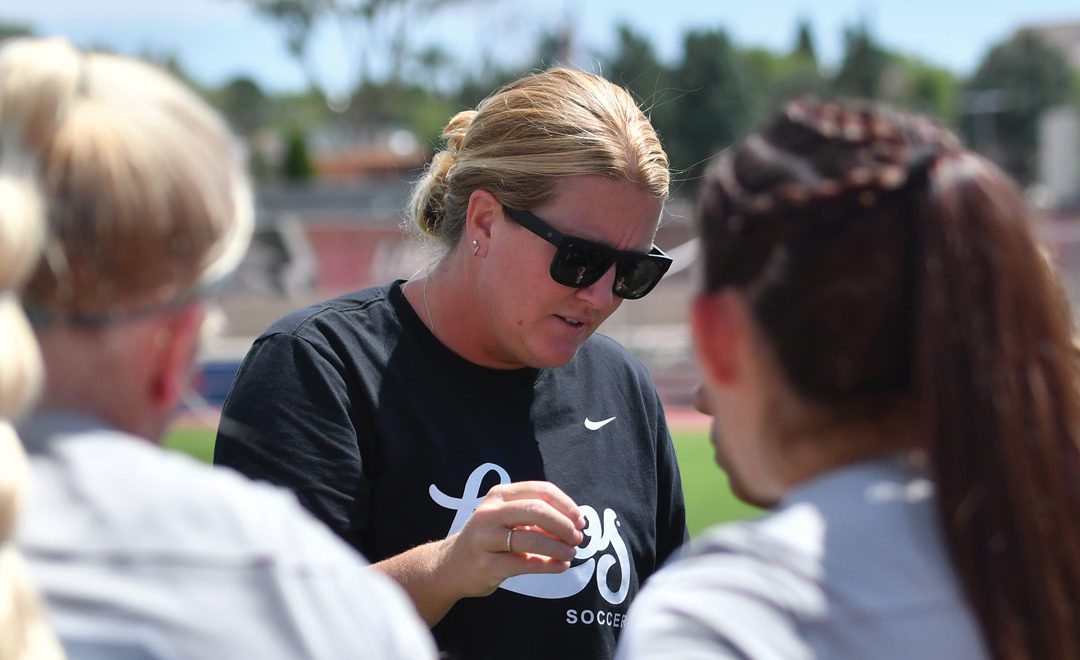
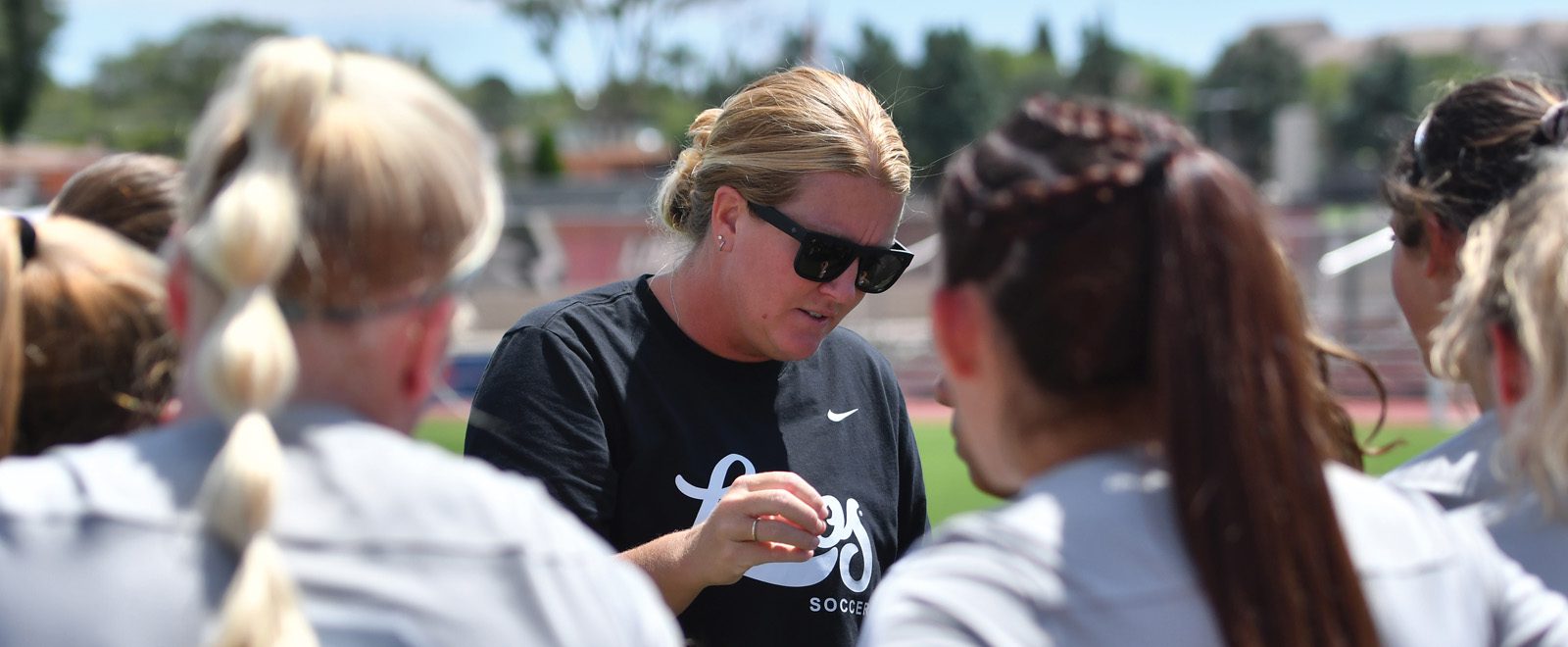
“This Game Has Given Me Everything”
Heather Dyche takes UNM soccer to new heights and is grateful for every moment
By Glen Rosales
Perhaps a telling measure of Heather Dyche’s regard within the soccer community came last summer when she was hired by New Mexico United as a technical staff special advisor for the men’s professional team that plays in the USL Championship League.
This was somewhat groundbreaking for the league, as she became only the second woman to join a team’s technical staff. But for Dyche, accomplishing the unusual was nothing unusual.
Dyche, who has been The University of New Mexico’s soccer coach since 2015 and guided the Lobos to consecutive NCAA tournament appearances for the first time in program history, has made a habit of busting gender-based constraints through her sheer ability to achieve results.
“The opportunities the sport gives you are so unique. And when you’re the facilitator of that and you get to create that for your athletes, that’s pretty cool,” she said. “I just fell in love with that. I love coaching. I still do.”
Dyche, 42, was a two-sport, four-year star in both soccer and basketball at Eldorado High School in Albuquerque, playing hoops under soon-to-be UNM women’s basketball coach Don Flanagan.
She accepted a soccer scholarship at Nebraska but wanted out after one year and toyed with the idea of returning home to play again under Flanagan for the Lobos.
“It came down to Florida State soccer or UNM basketball,” Dyche said. “That was my final two choices. And actually, Coach Flanagan told me to go play soccer. He said, ‘You can come here if you want. I know you’ll play. There’s a scholarship for you. But you’re a soccer player, I know you are.’ And he was right.”
After three successful years playing for the Seminoles, Dyche was ready to join the Atlanta Beat of the professional Women’s United Soccer Association. But the league folded before she got the chance.
A couple of her FSU teammates were headed back home to Norway to play and invited Dyche along.
“Which, obviously, is the coolest thing ever,” she said with a grin. “It was the time of my life. We had done a little bit of coaching during the latter part of it just to pay bills — running youth clinics and doing some of that stuff for the club. Then we took a coaching license there, actually because if you have the license, you got paid more. We were really broke.”
And that is where she got her first nibble of the coaching donut and was hooked.
“I really just thought it was fascinating,” Dyche said. “I had never really thought about the structure of coaching. When you’re an athlete, you just show up and it’s all set up for you. You don’t really think about everything that goes into it. I was fascinated by that. I didn’t coach for a living, but that definitely ignited an interest.”
When Dyche later returned to Albuquerque, the fiercely proud native New Mexican began coaching for a couple of local youth clubs for which she had played growing up and began earning increasingly higher coaching licenses.
When she finished her B license, her instructor, a former national program director for U.S. Soccer’s coaching program, encouraged her to dig deeper into the pursuit.
“He was the one that wanted me to get more into education,” Dyche said. She was working for the New Mexico Youth Soccer Association, teaching courses, which led to teaching on bigger stages — U.S. Soccer, CONCACAF, the Confederation of North, Central America and Caribbean Association Football, and FIFA, the Fédération Internationale de Football Association.
Dyche and former Washington Huskies women’s soccer coach Leslie Gallimore remain the only two women who regularly teach for U.S. Soccer.
“It was typically all men, so I was one of very few female instructors, as was she,” Gallimore said. “She didn’t seem to bat an eye at the environment. She was very confident in her ability to instruct.” That confidence and ability to focus on instruction is something Dyche said she constantly seeks.
“To me, it is knowledge-based, not gender-based,” she said. “If you put the time and energy into educating yourself, and hopefully you have if you get to wear the (U.S. Soccer) crest, then it has nothing to do with your gender, it has to do with your preparation. I don’t walk into a room and say, ‘Oh, it’s all guys or all girls, or it’s men and women.’ I see it as everyone coming together to work on soccer.”
It was that quality that attracted the attention of New Mexico United officials.
“Every time I’ve stepped away from a conversation with Heather, I felt like I’ve come away with a different perspective on myself as a leader, how I wanted to coach, or how I wanted to communicate and establish relationships with our players,” former United coach and technical director Troy Lesesne said at the time of her hire. “The reason for this hire isn’t to make a splash. The reason is we’re getting an extremely talented coach — someone that is one of the best coaches in New Mexico, and one of the best coaches in our country. Heather is somebody that is going to open up more doors for women to be involved in the men’s game.”
Dyche says she really doesn’t see herself as a leadership trailblazer.
“Leadership is always something you strive to be better at,” she said. “You have to role model that excitement and passion. I think if you don’t have that, you shouldn’t be coaching. Because I love soccer so much and I love the environment so much, I think that’s probably perceived as leadership, because I love what I do.”
Dyche, the coach, can’t see herself doing anything else.
“I wake up every day and I feel really grateful that I get paid to do this job. It’s just amazing to me,” Dyche said. “And I think everybody has a little bit of an imposter syndrome where you say, ‘You’re going to get found out.’ But I feel that way mostly because I don’t ever want to lose it. It’s not lost on me that I’ve never done anything else in my life other than soccer. It’s paid for my school; it’s paid my travel; it’s paid for my livelihood. This game has given me everything and I think you show gratitude for that with humility and hard work and you put it back into it. Those things have always paid off for me.”
Rachel Balkovec makes baseball history, former Lobo catcher climbs the MLB ladder…
Read MoreUniversity of New Mexico alumnus Jimmy Santiago Baca found peace in the written word…
Read MoreIn a new biography, “Tony Hillerman: A Life,” James McGrath Morris devotes a chapter to Hillerman’s years at UNM…
Read MoreAmong campuses, which traditionally feature brick, stone and ivy, UNM has always been distinctly of New Mexico…
Read MoreYou can thank an alumnus for creating the image technology that keeps us connected…
Read MoreWhen I decided to attend UNM I applied to live on campus because I wanted to become involved in student life…
Read More
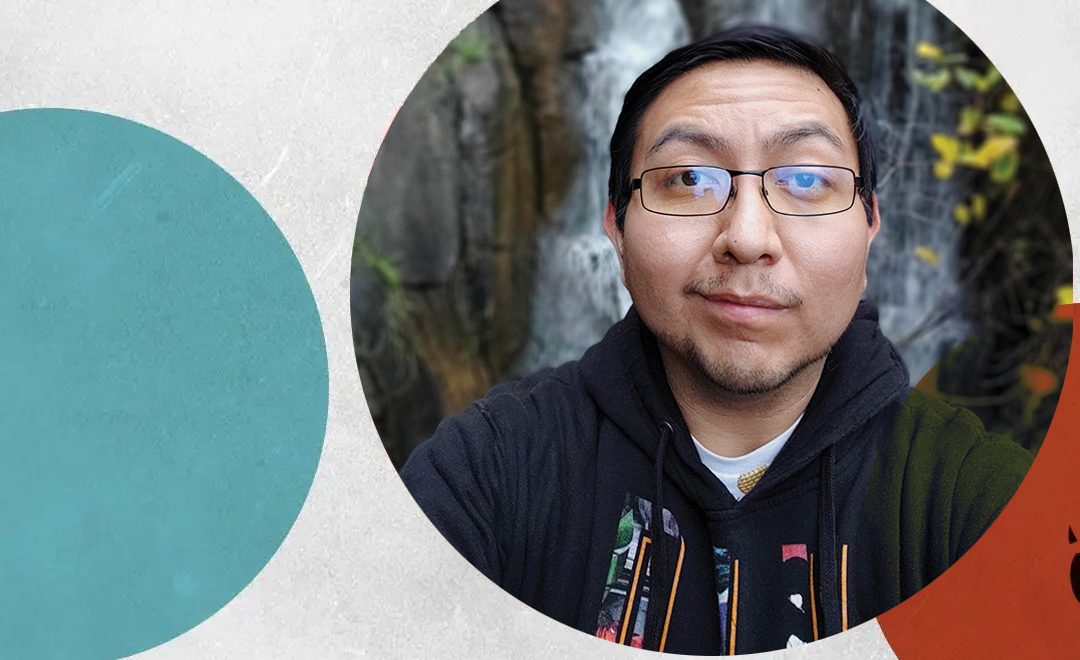
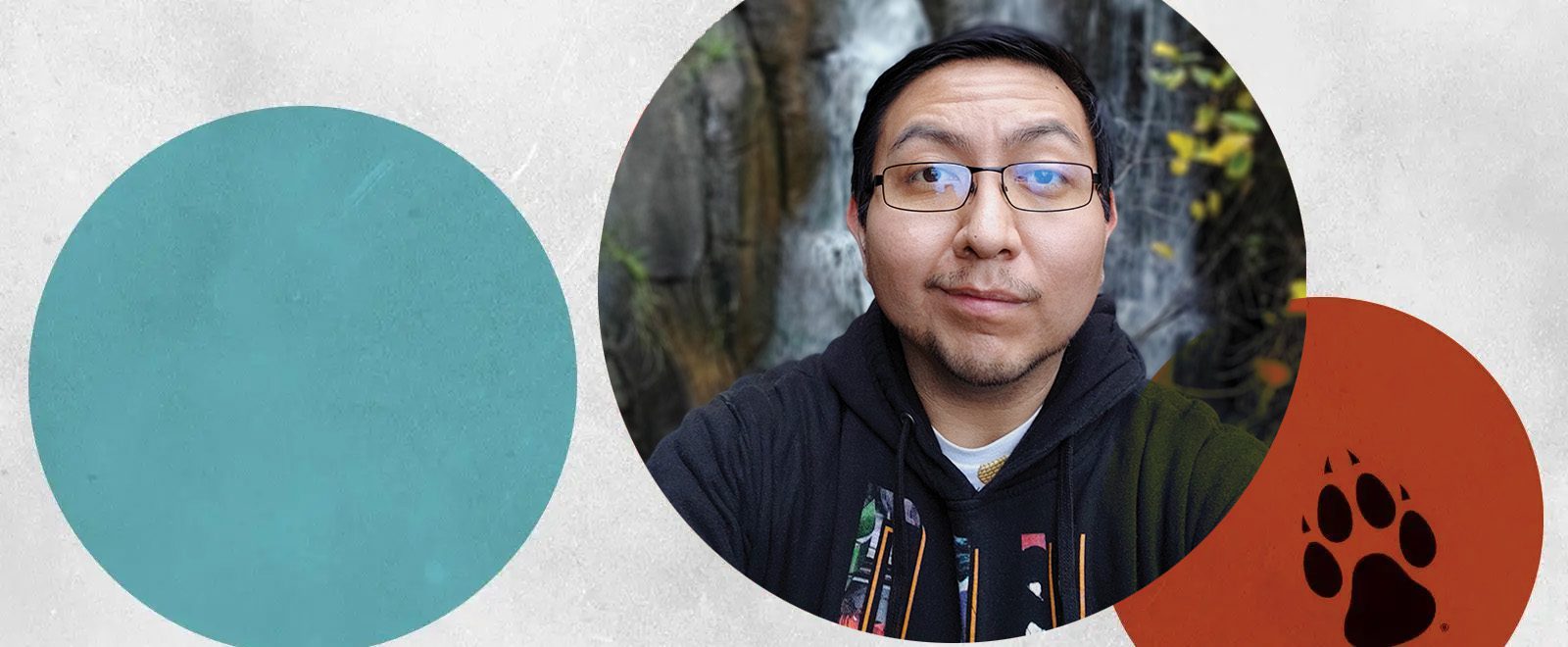
I was born and raised in Gallup, N.M., just a two-hour drive west of Albuquerque. I spent most of my childhood learning about art through history and elective classes in public school. I took a gap year after high school to help out my paternal grandmother, who lives in a rural area of the Navajo Nation. I decided to further my education at UNM-Gallup in 2012. Working toward an associate of arts degree in Studio Art, I learned more about the great artists and was on a path to become a professional artisan.
When I decided to attend UNM in Albuquerque to receive a bachelor of arts in Studio Art, I applied to live on campus because I wanted to become involved in student life and make new friends. I felt connected with student life on campus and made memories with friends that I stay in contact with today.
Currently, I work at the Octavia Fellin Public Library in Gallup as the experiential learning coordinator. I plan programs and events ranging from visiting guest speakers, STEM activities for teens, gardening workshops, art classes and more! During the COVID-19 pandemic we did a quick switch to provide curbside services and virtual events without skipping a beat and never closed. I also volunteer my time working with McKinley Mutual Aid, the New Mexico Social Justice & Equity Institute and Northwest New Mexico VaccinEquity.
I try my best to make art on the side and have participated in multiple art shows and juried exhibitions. Most recently, I donated two photographs and a watercolor painting to an auction benefitting the New Mexico Library Foundation.
Since leaving UNM, I have stayed in touch by volunteering with the UNM Young Alumni, a great way to connect with other professionals.
I’m a Lobo for life!
Joshua Whitman
(’18 BFA)


Last fall, we changed software systems for gathering information which includes the listings for alums who have died this past year. If the name of a loved one who died between July 1 and Dec. 31, 2021 is not included in these pages, please accept our condolences and know we want to honor your family member or friend in our alumni magazine. Please let us know their name via email at alumni@unm.edu. We will include the name in the In Memoriam section of our Fall 2022 print issue.
Julia M. Ford ’24
New and notable releases from Ray Windsor, Michael Malek Najjar, Hakim Bellamy, and other UNM alumni…


Black and immigrant girls of color often face indifference and even cruelty in the classroom, according to newly published research by Ranita Ray, associate professor of Sociology at UNM.
Ray is currently working on a book and several articles based on four years of ethnography within a range of educational institutions in the Southwest. She spent two to three days a week for three years in two predominantly economically marginalized and racially minoritized schools and found that while racially marginalized girls may have made academic gains, school is nevertheless a hostile institution for them. Black and immigrant girls of color experienced gendered racial harassment, erasure of intellect and estrangement within their communities. The girls’ experience included the verbal abuse by teachers, most of whom were white.
“For Black and recent immigrant girls of color the classroom is a psychologically traumatizing, alienating and emotionally violent place where they face gendered-racial harassment from teachers, their intellectual contributions are erased, and they become estranged from their communities inside schools,” Ray said.
Ray believes that having more Black, Indigenous, brown and queer teachers “is the urgent resolution, but we also need to keep in mind the historical and contemporary role of schools as oppressive institutions.”
The article will be published in the journal Gender & Society. The book will be based on the larger study.
UNM's Jessica Richardson awarded grant to optimize treatment for the language disorder known as aphasia...
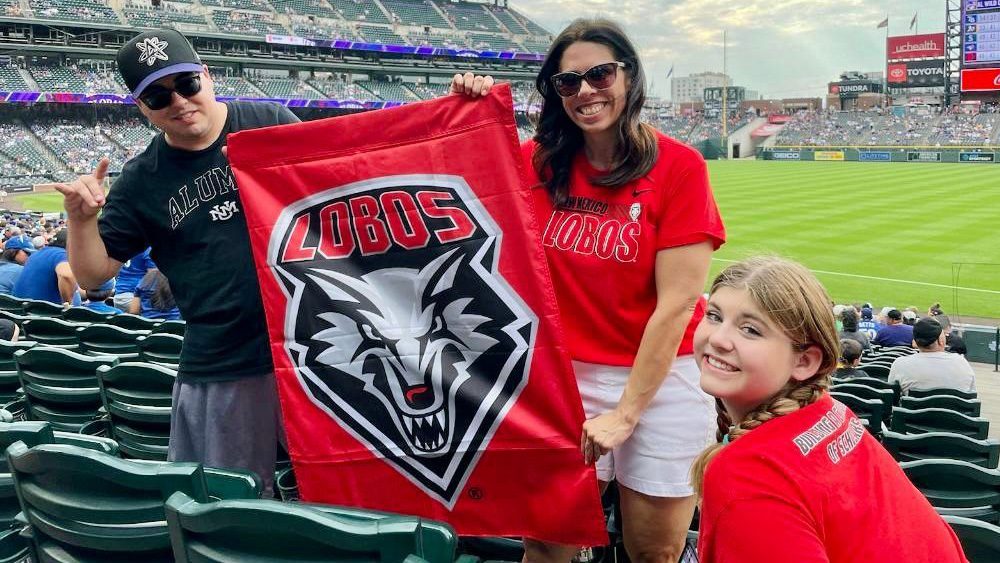
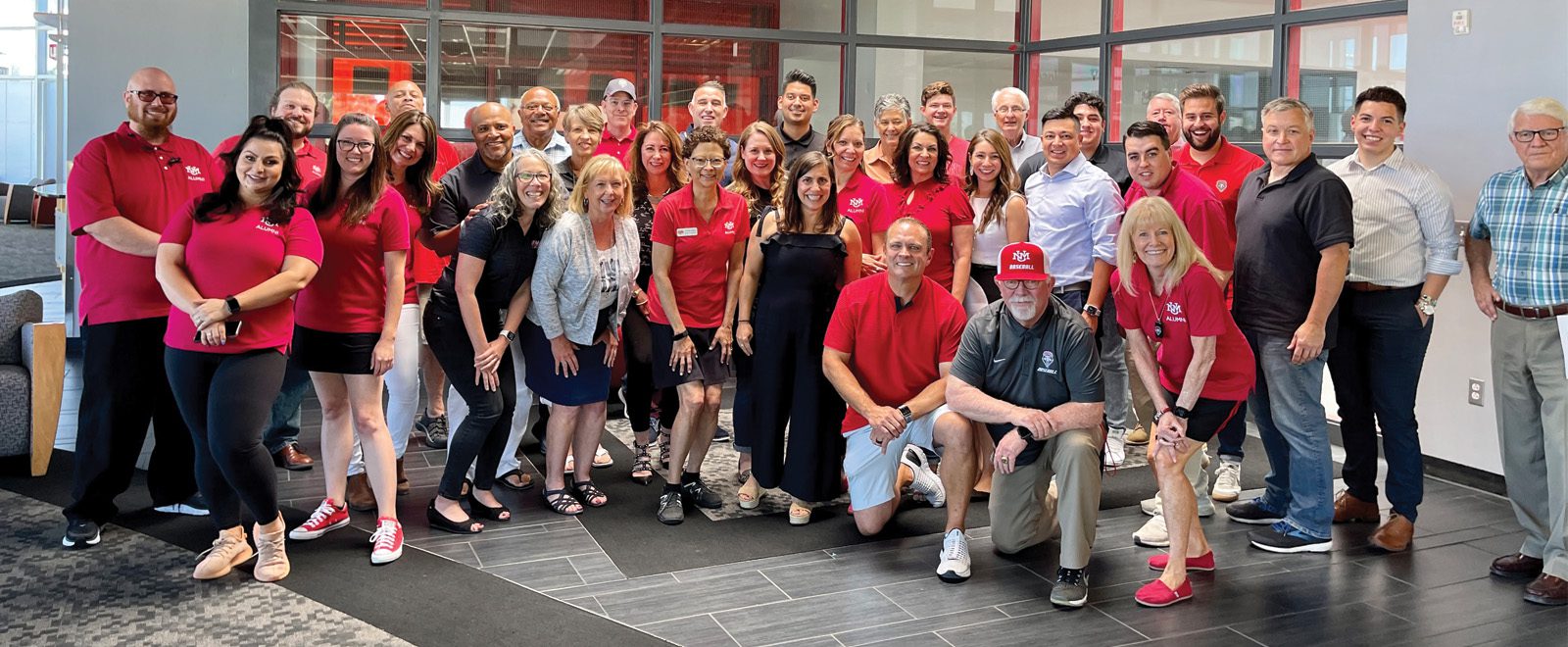
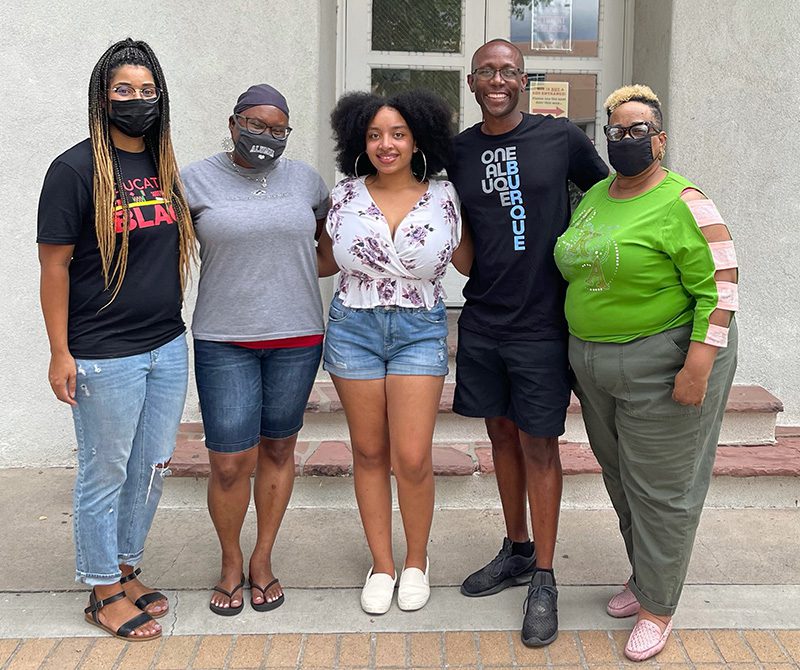
Director of African American Student Services Brandi Stone (’14 BA, ‘17 MPA) with the UNM Black Alumni Chapter President Deidre Gordon (’98 BA), Treasurer Patrick Barrett (’14 BA), Vice President Dee Dee Hatch Sanders (’93 BUS), and their Joe Long Scholarship Recipient Monice Aguilar (middle).
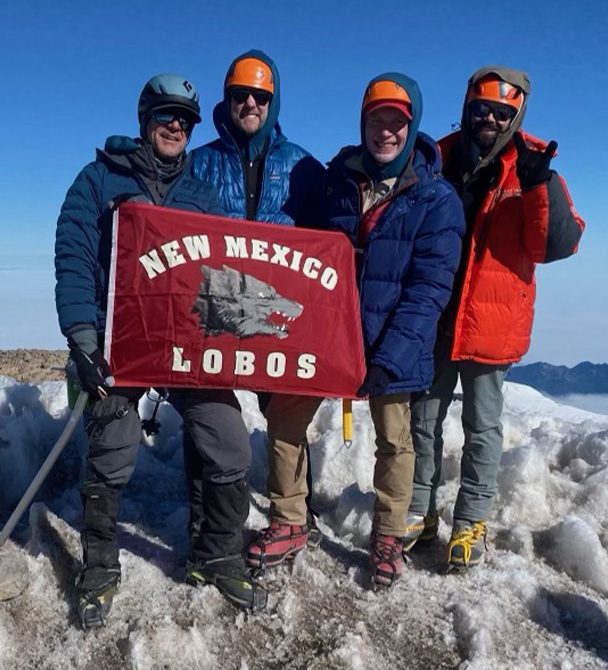
Ryan Brophy, Duncan Cruickshank (’87 BA, ’90 MBA), Donald “Don” Appleby (’90 BBA), and Victor “Vic” Perini (’91 BSPH) climbed and summited the Emmet glacier route to Mount Rainier, 14,410 feet, Washington State with the leadership of RMI guides. Brophy was a baseball player and the other 3 – Cruickshank, Appleby, and Perini were four-year swimming lettermen.
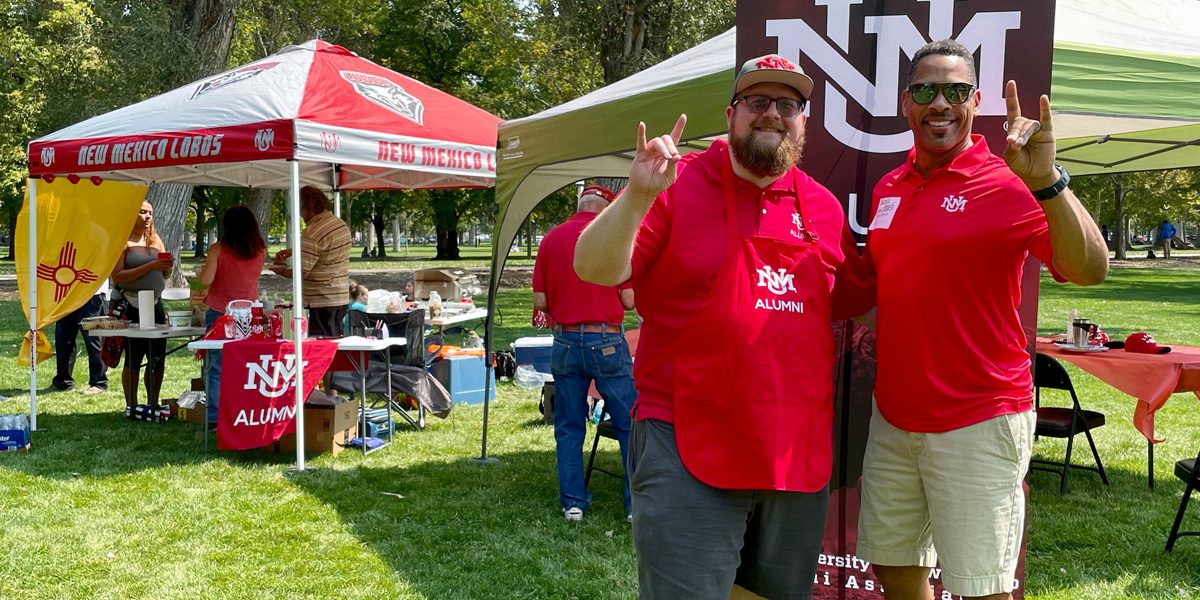
Chapter Leader Paul Tyhurst (’12 BBA) and UNM College of Fine Arts Dean Harris Smith get their spicy fix at the annual Salt Lake City Green Chile Social.
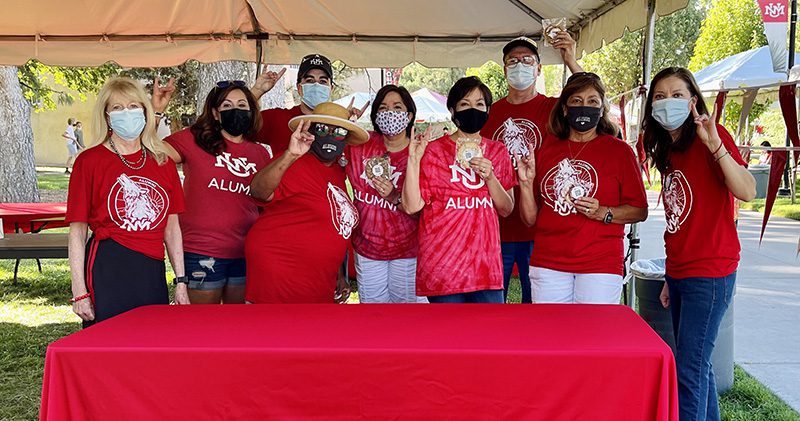
UNM Albuquerque Chapter welcomes students back to campus.
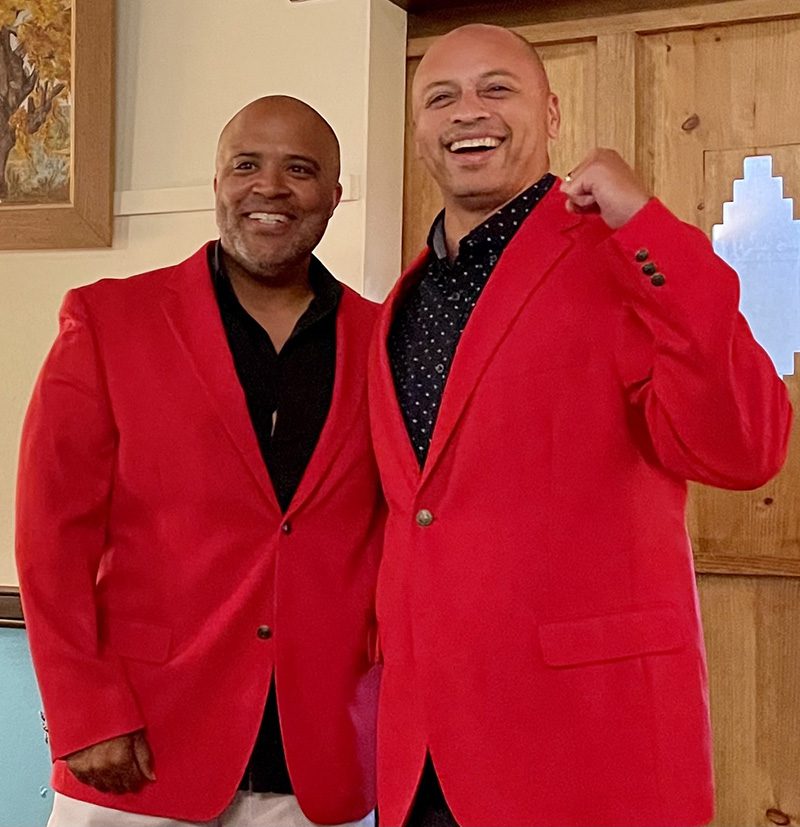
Outgoing UNM Alumni Association President Chad Cooper (’01 MBA) celebrates transition of leadership with incoming President Michael Silva (’95 BA).
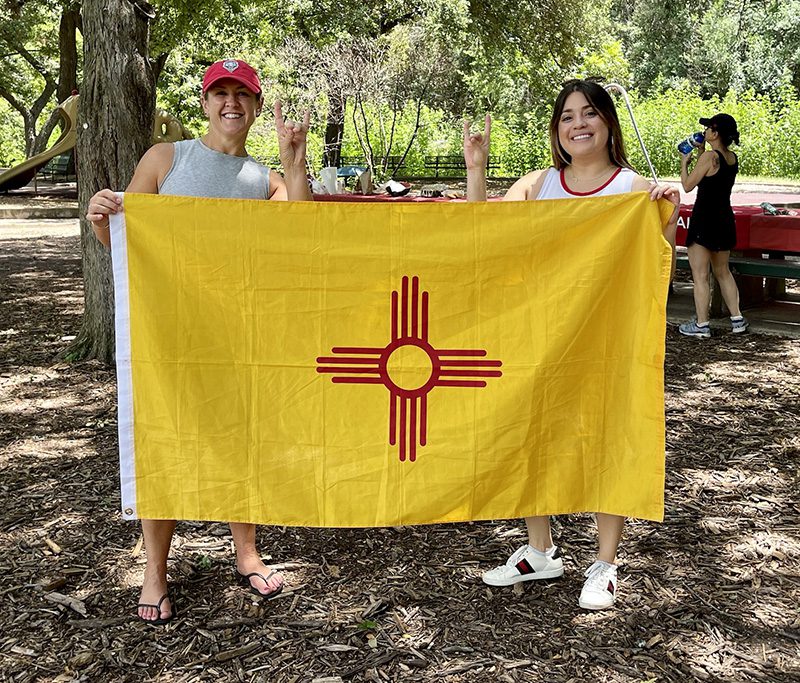
UNM alumnae Lindsay Scott (’18 Ph.D) (left) and Mariah Mármol (‘16 BA) at the Austin Green Chile Roast and Picnic.
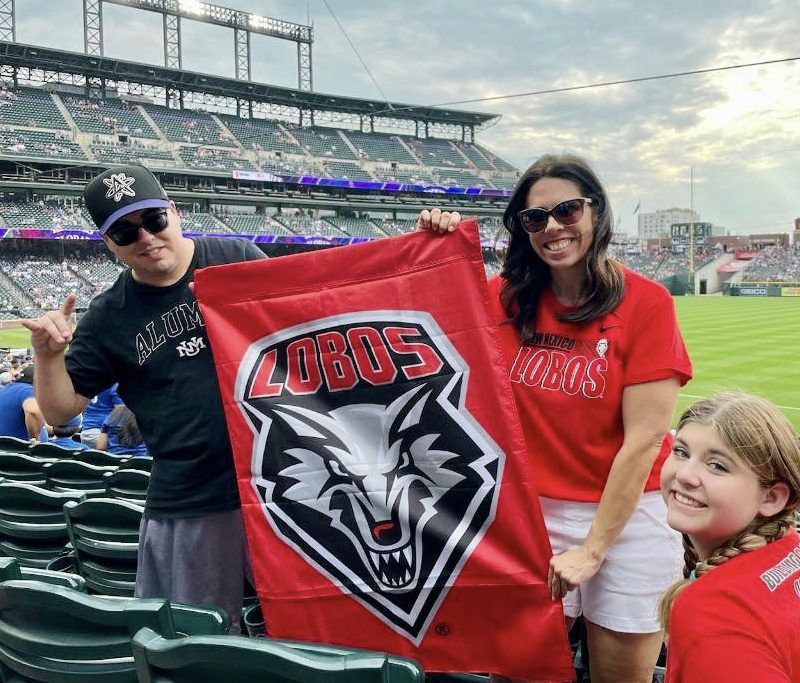
Scott Sanchez (’16 BA) and Chapter President Alissa Vandel (’00 BA) cheer on the Rockies with fellow Denver Lobos.
Recent Comments